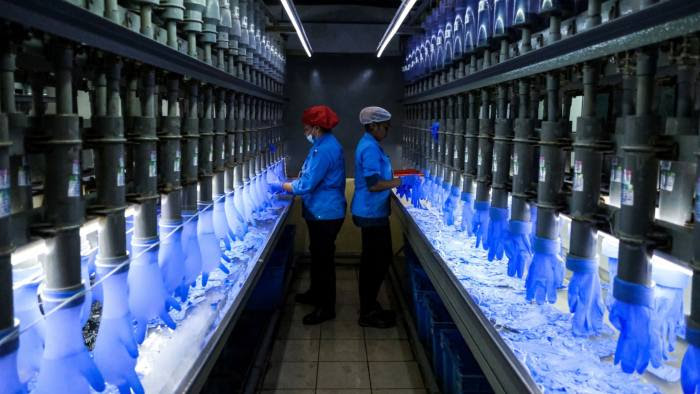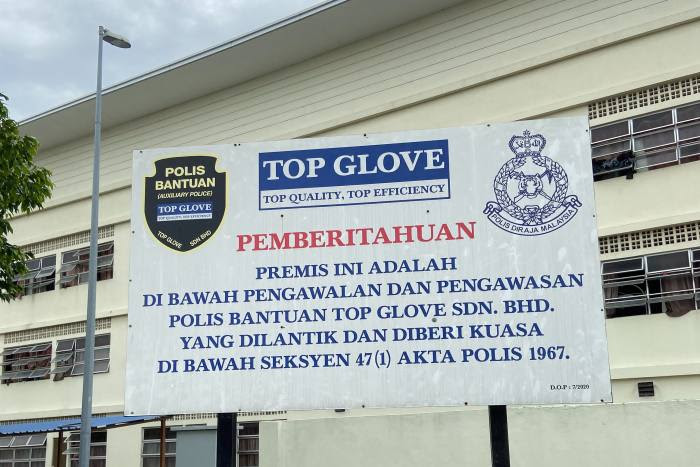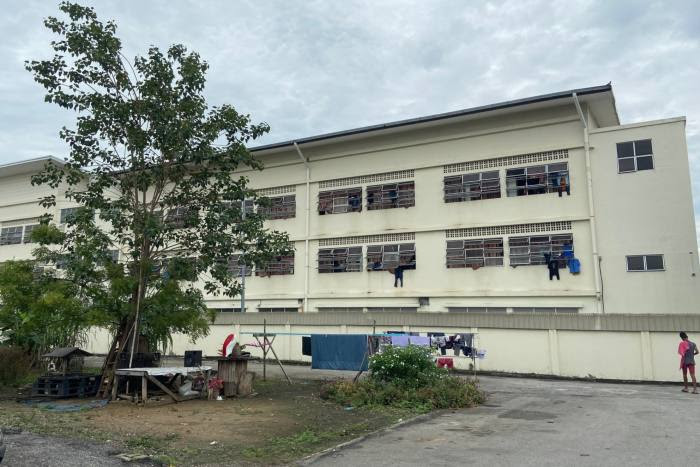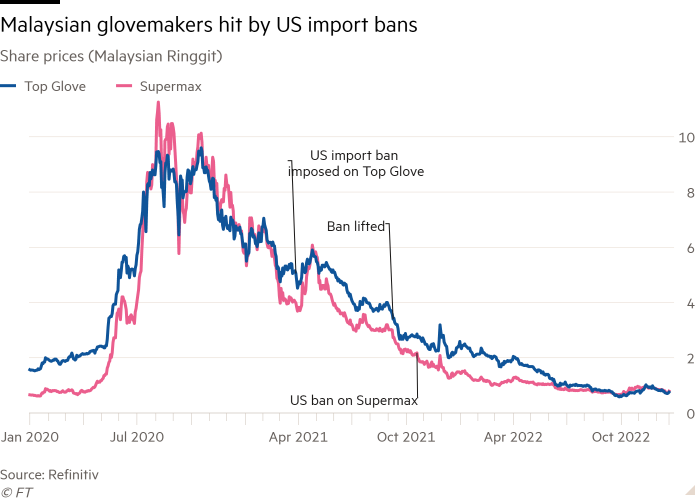Financial Times 3rd January 2023: Asia-Pacific companies
Top Glove strives for image as clean as its products
https://www.ft.com/content/ecd7571d-591f-487b-8dfd-272c3afbf41c

Malaysia produces up to two-thirds of the world’s rubber gloves with Top Glove alone claiming a 26% market share © Samsul Said/Bloomberg
Leading rubber glove maker has struggled to shake off concerns about its labour practices Malaysia produces up to two-thirds of the world’s rubber gloves with Top Glove alone claiming a 26% market share © Samsul Said/Bloomberg
Oliver Telling in London
In a meeting room on the 21st floor of Top Glove Tower, the Malaysian headquarters of the world’s biggest rubber glove maker, two employees demonstrated the new company chant.
“Thumbs up, ready, one, two, three,” they said. “Clean well, eat well, work well, exercise well, sleep well. Healthy! Healthy! Healthy!”
In the 23-storey glass-fronted complex just outside Kuala Lumpur, staff are only allowed vegetarian food in the canteen and are “encouraged” to visit the in-house gym before or after work, a public relations employee told the Financial Times during a tour. Like other workers, she wore a badge that read: “Corruption and bribery is a crime. Be honest. No cheating.”
Top Glove, which has in recent years suffered its own reputational crisis, has a strong incentive to convince outsiders that it is committed to employee welfare and business ethics.
Until the Covid-19 pandemic, the group had quietly led a national industry that produced up to two-thirds of the world’s rubber gloves. Top Glove alone claims a 26 per cent market share.
Then, soaring demand for personal protective equipment drew international attention to the sector. Top Glove was hit with allegations of forced labour in its factories, leading to a US ban on its products. Similar bans have since been placed on three other groups.
Pressure on the industry continues: Britain’s National Health Service last year made a commitment to procure gloves only from companies that had been independently audited for labour abuses, following a legal challenge against the decision to add Supermax, another Malaysian business, to the NHS supplier list.
Concerns about forced labour are not unique to the Malaysian glove-making industry. But the sector has faced one of the most notable regulatory crackdowns in Asia since manufacturing shifted eastward. As western policymakers tighten scrutiny of global supply chains, its struggles could be an indicator of the trouble to come for other industries.
“It’s nothing specific to gloves. [Other] intensive industries with migrant workers have the same [problems],” said Andy Hall, a prominent labour rights campaigner in Asia. “But until they are under pressure, nothing changes.”

‘This premises is under the control and surveillance of the auxiliary police,’ reads a sign outside a Top Glove dormitory for workers © Oliver Telling
The controversy surrounding the Malaysian glove-making industry has centred on the dormitories and factories where many staff, typically poor migrants from across Asia, live and work. At one Top Glove dormitory last summer, about a 30-minute drive from its headquarters, the control that the company exerts over its workers remained clear.
Surrounded by a 3m-high wall lined with barbed wire and security cameras, a three-storey complex housed scores of migrant workers in dingily lit rooms. A sign warned that the facility was under the control of the Top Glove auxiliary police.

Top Glove says problems at its facilities and dormitories like this have been resolved, citing an independent assessment that confirmed forced labour was no longer a systemic issue. © Oliver Telling
In Top Glove factories and facilities like this, an independent report in 2020 identified as many as 10 indicators of forced labour, as defined by the International Labour Organization. Wages and identity documents of workers had been withheld and 8 per cent of the 331 staff interviewed said they had suffered abuse, including violence and sexual harassment. Some 93 per cent said they had paid fees to secure a job, leaving many in debt bondage.
Top Glove has declared each of these problems resolved, citing an independent assessment that confirmed forced labour was no longer a systemic issue in its direct operations and more than $36mn had been paid to workers to refund their recruitment fees. The US ban on its products was lifted in 2021.
But people who have worked closely with Top Glove suggest it will have to go further to live up to its claim to be a “leading employer”.
“It was clear Top Glove didn’t want to go any further than the minimum [needed to get off the US sanctions list],” said Hall, who said he was appointed to a Top Glove governance committee as an adviser. He argued the company had a responsibility to compensate workers for labour abuses as well.
Puvan Selvanathan, a former UN human rights adviser, said that Top Glove convened in 2021 a “working group” of experts from seven non-governmental organisations, which advised the company on complying with labour regulations and other issues. But he said the engagement ended without the company adopting its two key suggestions: to conduct a human rights due-diligence assessment and to carry out a comprehensive survey of workers’ experiences.
“Is Top Glove ready for [stricter legislation on labour rights]? I would have to say no,” he said. “Unless you have learnt how to make your management system more robust to recognise these symptoms in the future, [problems could happen again].”

Top Glove has pushed back against suggestions that it is still falling short on governance standards. It told the Financial Times the company had been recognised as a leading employer through various awards and ESG leader boards, including S&P Global’s “Sustainability Yearbook 2022”. It said the governance committee had served its purpose of remediating recruitment fees and that the company had implemented “some good feedback” that it received from conversations with other groups.
Top Glove said “endeavours towards improving employee engagement and welfare are an ongoing effort”, adding that barbed wire and security personnel “are common security measures used even in private housing areas in Malaysia”.
Besides questions over corporate responsibility, Top Glove and many of its peers face immediate financial pressures, as demand plunges in the wake of the pandemic. Customers have built up huge stocks of unused gloves during the health crisis, depressing prices further. In the three months to last August, Top Glove said sales had more than halved over the previous year to $990mn.
After years of leading the industry, Malaysian glovemakers are also warning of intensifying competition from rivals in countries such as China and Thailand, while the shares of Top Glove, Supermax and their peers have been on the slide.
Back inside Top Glove Tower, managing director Lim Cheong Guan acknowledged the industry was facing “challenging times”. Top Glove’s expansion plans have been deferred, he said, adding that some struggling factories would have to close. Asked how easy he finds it to follow Top Glove’s “five wells” — to clean well, eat well, work well, exercise well and sleep well — Lim laughed, knowingly.
“It’s a good reminder,” he said. “Sometimes we stray a bit.”
Additional reporting by Jyotsna Singh in Delhi